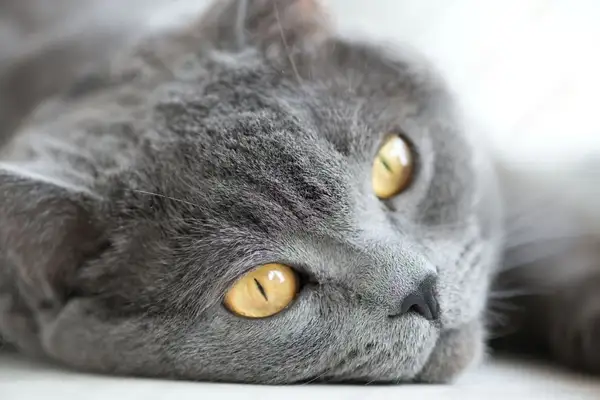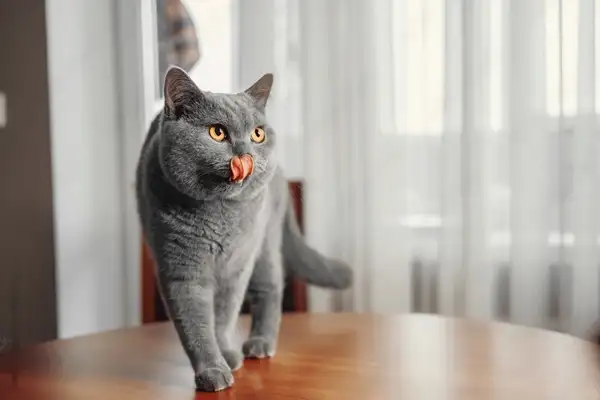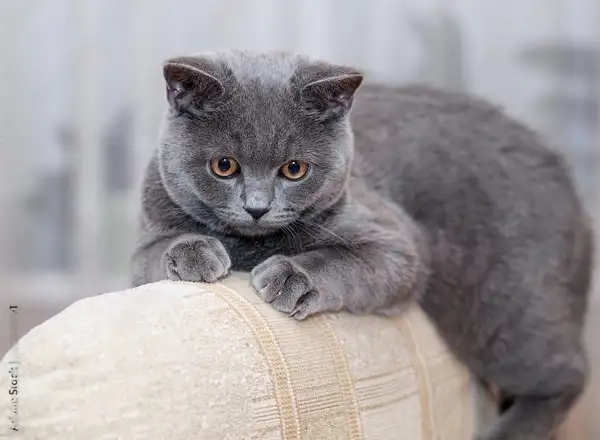Certain felines crave our continuous and undivided focus, desiring to be with us all the time, either staying close or napping on our laps. On the other hand, some prefer taking their beauty naps in the seclusion of their own bed.
Where do teddy bear-like kitties fit into this range? Do British Shorthair cats enjoy cuddling, or do they tend to be more aloof and elusive? Untamed provides insight into their character and idiosyncrasies, enabling you to determine if this feline would make a suitable companion for you.
Are British Shorthair cats cuddly?
British Shorthair cats are known to be reserved yet extremely friendly. They make excellent family pets, get along well with most other cats, and are amiable towards cat-friendly dogs. Moreover, they have a fondness for children and enjoy engaging in conversations, although their voices are generally soft and not too loud.
When it comes to cuddling, British Shorthairs will tolerate it but prefer more subtle expressions of affection. While they are friendly and sociable for cats, they typically don’t fancy being picked up and carried. Instead, they prefer snuggling up next to you on the sofa as a way of showing their affection.
Also Read: Are British Shorthair Cats Hypoallergenic?British Shorthairs may not be traditional lap cats, but they truly enjoy the company of humans. They readily form strong bonds with their owners and warmly welcome any visitors. While your British Shorthair may appreciate petting and might tolerate a brief cuddle, they tend to show affection in less physical ways. For instance, they often prefer staying close by, following you around the house, and observing your activities.
Although British Shorthairs are affectionate, they are not clingy pets. They value interactions but also feel content in their own space. They happily find comfort in their favorite spots for napping or amuse themselves with toys and games.
If you’re wondering about the type of affection they do appreciate, British Shorthairs generally enjoy being stroked and petted. While they may not be overly affectionate in the conventional sense, they do form deep connections with their owners. As for encouraging more physical affection, it’s essential to be patient and understanding of their individual preferences.
In the following sections, you’ll discover more about the temperament and preferences of British Shorthairs. This will shed light on the kinds of affection they enjoy and provide insights into their unique characteristics.
Does your British Shorthair enjoy sitting on laps?
To put it plainly, British Shorthairs are not lap cats. They are a bit reserved, valuing their personal space and privacy. They will let you know when they want to be left alone. These cats are quite independent, so you can leave them alone while you’re at work without fearing they’ll cause havoc in your home.
Though they may not be overly enthusiastic about cuddling, British Shorthairs are still affectionate and devoted felines. They express their loyalty in various ways, showing their affection through different means.
Does your British Shorthair enjoy Hugging?
Do British Shorthair cats like cuddles? While they may look round, soft, and adorable like teddy bears, many of them are not fond of being scooped up for hugs. Although they are friendly and loyal, they prefer more restrained petting and snuggling rather than enthusiastic cuddles.

These cats are patient and forgiving, especially with young children who may want to hug them tightly. However, it’s essential to respect their boundaries and not insist on excessive hugging or petting, as this can make them wary and hesitant to be near you.
While cuddling might not be their favorite activity, British Shorthairs demonstrate their love and attachment to you in other ways. They are generally non-confrontational and will calmly walk away from situations they don’t enjoy rather than becoming aggressive. This makes them a good choice for families with kids, as they are less likely to react aggressively to rough play.
It’s crucial to be mindful of your cat’s comfort and not assume they enjoy an activity just because they tolerate it. Keep cuddle sessions short and let go if you sense any signs of discomfort or stiffness in your cat.
Also Read: Female Vs Male British Shorthair CatsHow Do British Shorthair Show Affection?
Your British Shorthair might not be the type to enjoy being the “little spoon” during cuddles. However, there are other signs that show your cat’s love and affection towards you.
Just like other cats, British Shorthairs like to explore their surroundings. If your cat follows you around, plays independently, or rests comfortably in its own space, it doesn’t mean they are disinterested. It indicates that your cat feels secure and content in their environment.

Vocalization is another significant indicator, especially for British Shorthairs. While they may not be as chatty as some breeds, they do express themselves vocally. If your cat cuddles up to you and purrs, it’s a sign of a positive and contented experience.
Grooming is a meaningful bonding experience between cats and their owners. If your cat allows you to brush or comb its fur, it shows trust and affection. Some cats may even reciprocate the gesture by licking you, engaging in mutual grooming behavior.
Playful actions also convey affection. Kneading with their paws, pawing at you gently, or nibbling are playful signs of bonding. Cats may also head-butt you or rub their cheeks on you, which are behaviors learned from kittenhood, symbolizing their love and familiarity with you.
Also Read: 10 Important Facts To Know About The British Shorthairs as PetsTummy Rubs
Another way British Shorthairs show affection is by allowing tummy-rubs. Usually, a cat’s tummy is considered a sensitive area, and rolling onto her back might signal trust rather than an invitation for belly rubs.

However, British Shorthairs are different. When they roll over, they genuinely enjoy getting tummy-rubs. Running your hand over their plush belly fur can be an incredibly delightful experience. Just make sure to approach slowly at first to avoid startling your cat.
Moreover, British Shorthairs express their affection by snuggling up to you while you relax or by curling up on your bed. They may not be overly demonstrative, but they cherish your company in a calm and polite manner. They genuinely relish receiving attention and affection in return.
Also Read: How Long Do British Shorthair Cats Live?What Are The Signs My British Shorthair Is Uncomfortable With An Activity?
Due to their loving and gentle nature, British Shorthairs can endure uncomfortable situations for quite a while before resorting to scratching or biting. If you’re accustomed to more high-strung cat breeds or feisty non-pedigree cats, you might believe that a cat will always make it clear when they dislike something.
However, British Shorthairs have a stoic disposition, which means they may not immediately express their discomfort. While this isn’t true for every individual, as a breed, they are more likely to tolerate annoying or even painful treatment from their human companions for an extended period compared to other cats. This is particularly noticeable in their interactions with children.

It’s essential to be attentive to your British Shorthair’s body language and signals, even if they don’t overtly show their discomfort. Respecting their boundaries and providing gentle and loving interactions will foster a strong bond and ensure a harmonious relationship with these lovely felines.
The Final Sign…
When a British Shorthair is pushed to its limit, its last resort will be to emit a yowl and give a warning swat to communicate discomfort and urge you to let go. It’s crucial to understand that these cats are not to be treated like stuffed toys or manhandled. They are living beings with their own needs and desires.
Remember, a cat is not a doll or an object to be played with carelessly. They deserve to be treated gently and with sensitivity to their feelings. By understanding and respecting their needs, you can build a strong and loving relationship with your British Shorthair based on trust and mutual understanding.
Also Read: How Much Does A British Shorthair Cat Cost (US/UK/AU)?Is it possible to Train British Shorthairs to Enjoy Cuddles?
To be honest, trying to change your British Shorthair’s aversion to being held is likely to lead to frustration and unhappiness for both you and your feline companion. Tricks like petting the cat while she’s eating or giving her treats while on your lap may work with neglected or feral cats to get them used to human contact, but it’s unlikely to make a British Shorthair enjoy cuddles if she doesn’t like them.
Forcing your cat to endure unwanted contact in an attempt to make her “get used” to hugs will only backfire. It can make her avoid any kind of contact, fearing it might turn into another unpleasant experience. It might even cause her to become fearful of you, which is detrimental to your bond with her. Instead, it’s best to accept and appreciate the affection she does offer, such as brief hugs and cuddles, as well as her company, playfulness, and relaxation with you.
Also Read: Do Cats Kill & Eat Squirrels?Remember, not wanting hugs is not a bad habit that needs to be corrected. Your cat loves you and is attached to you; This specific breed of dog is not as prone to being overly attached compared to other breeds.

Hi, this Sienna Metts, the purr-fect authority in the captivating world of feline wisdom. I live in White Plains, NY. With years of experience in studying and understanding the behavior, health, and unique traits of different cat breeds, I have earned a well-deserved reputation as a feline connoisseur. Through my articles, I’ll be sharing captivating stories, practical advice, and expert tips on topics ranging from breed characteristics, care and eating guidelines to training techniques and holistic health solutions.


















